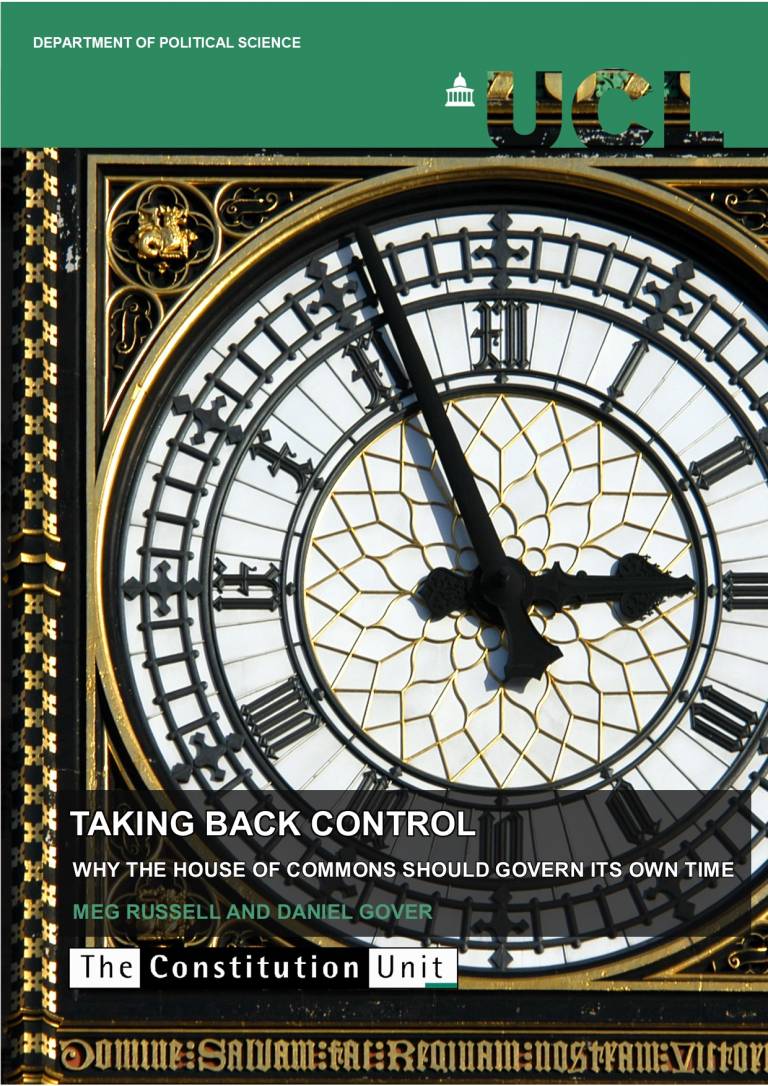NEW REPORT: Taking Back Control
19 January 2021
This report argues that the House Commons should govern its own time, and makes proposals for wresting such control from government.

Read the report: Taking Back Control: Why the House of Commons Should Govern its Own Time
Over recent years, there have been numerous controversies over control of the House of Commons’ time. At the height of the parliamentary battles over Brexit, media headlines focused on backbenchers ‘seizing the agenda’ and the government’s unlawful prorogation of parliament. More recently, the government’s handling of the COVID-19 crisis – in terms both of policy and of Commons procedure – has provoked anger from backbenchers and key parliamentary committees. At the heart of these conflicts have been questions about who can, and who should be able to, determine what the Commons is able to discuss and when.
At present, the government controls the Commons agenda to a very significant degree. Other MPs have little opportunity to influence this, and ministers retain monopoly control over mechanisms such as prorogation and recall, which determine the Common’s ability to sit at all.
This new report – written by Unit Director Meg Russell and Dr Daniel Gover – assesses the current system, the problems which have arisen from this in recent years, and how matters can be improved. It ends with 20 conclusions and recommendations for change, designed to shift the principle governing Commons procedures from one of government control to majority decision-making. In doing so, it picks up where key recommendations from the ‘Wright committee’ of 2009-10 (which based some of its own conclusions on Meg Russell’s previous research, and for which she worked as a specialist adviser) left off.
Key conclusions include:
- The extent of the government’s dominance of the Commons agenda is problematic. Recent clashes over this issue have caused hostility at Westminster, and fed anti-parliamentary rhetoric externally.
- The chamber should be given control over its own agenda, as is already the case in many other parliaments. The most effective way to do this would be for the government – which currently simply announces the week’s business as a fait accompli – to bring forward an amendable business motion to the Commons for approval.
- Although the parliamentary majority should in general control Commons time, there must also be protection for minorities. This exists through backbench and opposition time, but ministers have too much control over its scheduling. Instead of the current sessional allocations (which are unfair in longer sessions and provide too much ministerial discretion), a minimum amount of such time should be guaranteed fortnightly or monthly.
- MPs could also make more ambitious use of the Backbench Business Committee route on occasions when the government refuses to provide time for key debates, particularly where these relate to the chamber’s own running (such as recommendations from the Procedure Committee). This would be facilitated by the report’s other proposals above, but might also suggest a rebalancing to make more such time available.
- If changes to agenda access are to be effective, they must be accompanied by reforms which grant the Commons greater power over when it sits. Otherwise, ministers could – for example – shut down unwanted parliamentary debate by proroguing parliament.
- Prorogation should require House of Commons authorisation. In addition, the Commons’ role in authorising periodic adjournments (‘recesses’) should be strengthened.
- The Commons should also have the power to recall itself from recess – currently, this can only be done by the government. The most sensible way for this to be done would be for the Speaker to have the power to recall the Commons, based on a cross-party request from a minimum number of MPs.
- Some of these changes can be implemented easily and quickly. Others engage fundamental principles and it would be appropriate now for them to subject to formal review. This could be conducted by the Procedure Committee, or through a new ad hoc body similar to the Wright committee, potentially established under the auspices of the Commons Speaker.
Key links
Find the report, along with related commentary from the Unit and others, here.
Find the report’s conclusions summarised by Meg Russell and Daniel Gover on our blog.
Read Meg Russell's article in Times Red Box (£)
The Unit’s 'Brexit, Parliament and the Constitution' project, in collaboration with the UK in a Changing Europe
 Close
Close

